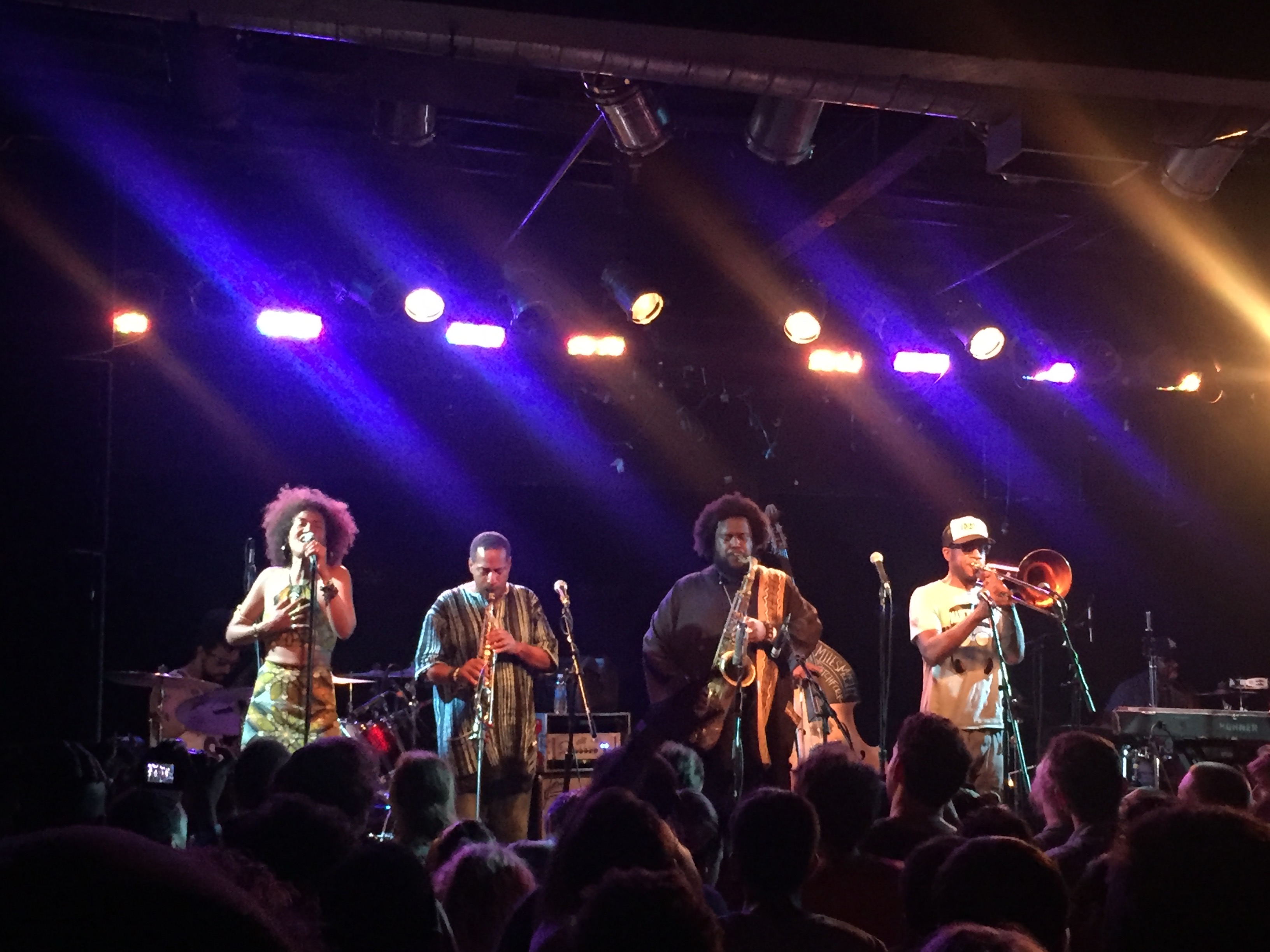By: Alex Wood
After touring tirelessly since last year’s release of The Epic, Kamasi Washington finished a Midwest run with a Pitchfork Music Festival aftershow at Bottom Lounge on Sunday night.
In the last year, the saxophonist popped up seemingly out of nowhere, his name in the liner notes of countless records and his praises sung by musicians and critics alike, his influence surpassing the jazz genre and leaking into hip-hop, funk, electronic and the jam band genres.
Put simply, Kamasi and his band share a purity of musical excellence that’s unavoidable and undeniable, the seven-piece outfit’s sets packed with an ecstatic energy met by few other musicians touring today.
Beginning shortly after 10:30 and performing until half past midnight, the band brought their all to the intimate venue, obviously excited to play their second Chicago set of the day.
“Let’s make it special,” Washington said before launching into the first massive jam.
Consisting of two drummers, an upright bassist, keyboardist, trombone player and female singer, the saxophonist’s band plays with unbelievable cohesion and force. Between songs, Kamasi would tell stories about the band members, all of whom he has known since high school or earlier.
Beginning with what sounded like a drum march, the band eased into a mellow instrumental before doubling their pace and turning the song into a stomping dance number. By Kamasi’s first, lengthy solo, the crowd was dancing and cheering, the band only picking energy up more as the soloist wails.
Though the John Coltrane comparison feels beat to death in describing saxophone players, Kamasi truly holds the classical, technical proficiency of past greats. Combined with his endless passion and obvious love of performing, the man is simply unstoppable once he begins improvising.
The song, lasting more than ten minutes total, continually morphed, eventually becoming a funky bass solo, the upright bass using effects pedals for a harder hitting rock sound. Five minutes into the solo, the band returns to the initial riff.
The song began as jazz-fusion, became classical bop-era jazz, morphed into an aggressive funk jam, and then finished as a combination of all three genres.
“Epic” wasn’t only a proper label for Washington’s debut album, but may be the best description of the musician as a whole.
“Final Thought” began with an extended trombone solo, though Washington’s saxophone still stole the show shortly after.
Kamasi invited his father, Rickey Washington, to stage for “Henrietta Our Hero,” a song written for his grandmother.
Kamasi spoke candidly of his grandmother before the song, movingly concluding the lesson she taught her grandchildren: “It’s not about what you have, it’s about what you do.”
Rickey performed flute on the song, and would appear on stage multiple more times throughout the show, also performing on soprano sax.
Washington introduced the fourth song as “Giant Feelings,” a track written by the keyboardist that Kamasi referred to as one of his favorites, speaking in genuine admiration of his band-mate.
The song fit the group’s jam-band sensibilities well, sounding like a better version of Lettuce, funky and fun but also more technical, musically and compositionally, than his peers. The keyboardist kept the track funky, eventually singing the lyrics through a Frampton-style voicebox.
There’s always been a link between jam bands and jazz, and Kamasi Washington is the perfect middle ground.
Kamasi then introduced the drummers, who performed a dueling solo lasting about nine minutes, the band exiting stage for the performance.
Again, the jam-band parallels are too obvious to need to spell out.
The highlight of the set was “Malcolm’s Theme,” a powerful song with lyrics consisting of Ossie Davis’ eulogy from Malcolm X’s funeral.
The song opened with a heartfelt solo from Kamasi, his tenor’s tone flawless and his improvisations dynamic and packed with ambitious runs. The singer’s delivery was otherworldly and full of passion, her emotion matched by the band.
The track grew endlessly more intense, until eventually the singer is simply screaming into the microphone, crashing drums and wailing horns beneath her voice, until she is eventually buried in the chaos of it all.
It’s a moving song, a social statement, a perfect example of music’s ability to convey emotion better than words possibly could.
After a short break, the group returned to a chanting crowd to perform “The Rhythm Changes,” a favorite closer for the band. Blending a classical vocal melody with a traditional, spacious jazz backing, the song is a perfect finale, wrapping up the bombastic set with a gentle conclusion.
Kamasi thanked the crowd and earnestly promised to return to Chicago every year. With a new album out in September and a notoriously gigantic back catalog of unreleased, recorded music, Washington won’t be going anywhere soon, and Chicagoans would be wise to get on board with an artist truly rising above the rest when the opportunity comes next.
Setlist:
1.) [unknown]
2.) Final Thought
3.) Henrietta Our Hero
4.) Giant Feelings
5.) Dueling Drums
6.) [unknown]
7.) Malcolm’s Theme
Encore:
8.) The Rhythm Changes